 Petzlover
Petzlover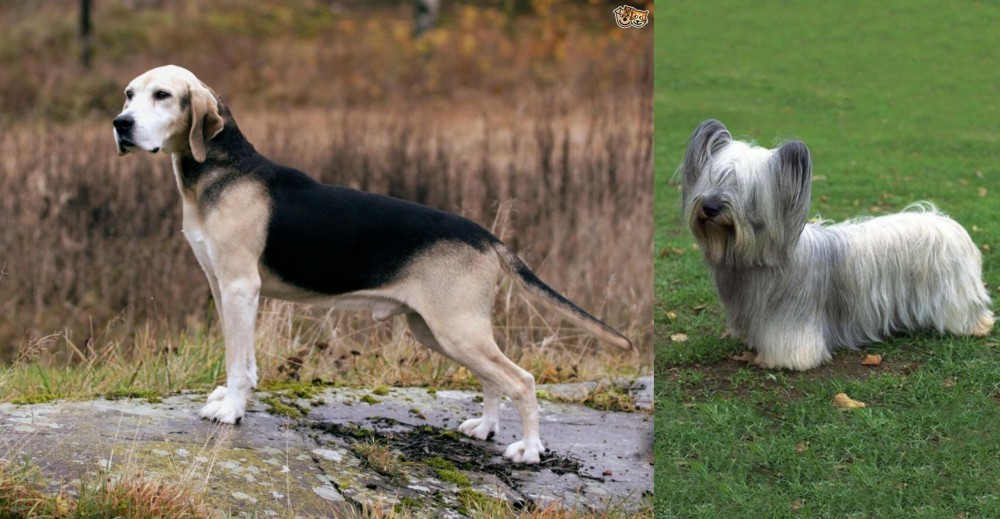 Dunker is originated from Norway but Skye Terrier is originated from United Kingdom. Dunker may grow 29 cm / 12 inches higher than Skye Terrier. Both Dunker and Skye Terrier are of same weight. Both Dunker and Skye Terrier has same life span. Dunker may have more litter size than Skye Terrier. Dunker requires Low Maintenance. But Skye Terrier requires Moderate Maintenance
Dunker is originated from Norway but Skye Terrier is originated from United Kingdom. Dunker may grow 29 cm / 12 inches higher than Skye Terrier. Both Dunker and Skye Terrier are of same weight. Both Dunker and Skye Terrier has same life span. Dunker may have more litter size than Skye Terrier. Dunker requires Low Maintenance. But Skye Terrier requires Moderate Maintenance
 Known as the Norwegian Hound, the Dunker hails from Norway. Bred and named after breeder Wilhelm Dunker to be a robust scenthound, Norwegian Scenthounds were crossed with a Russian Harlequin Hound because this particular dog was an excellent scent trailer and it could stand up to the freezing conditions of Norway.
Known as the Norwegian Hound, the Dunker hails from Norway. Bred and named after breeder Wilhelm Dunker to be a robust scenthound, Norwegian Scenthounds were crossed with a Russian Harlequin Hound because this particular dog was an excellent scent trailer and it could stand up to the freezing conditions of Norway.
The Dunker become popular in the mid-19th century in other Scandinavian countries. Hunters liked its intelligence, its robustness and its speed and strength. In 1902 a club was founded for the breed and in the same year the Norwegian Kennel Club recognized the Dunker.
The Dunker started dying out after the war, and in the late 1980s breeders of the Dunker petitioned to allow them to cross the remaining Dunkers with scenthounds. Today the dog is known in Norway but is uncommon outside Scandinavia.
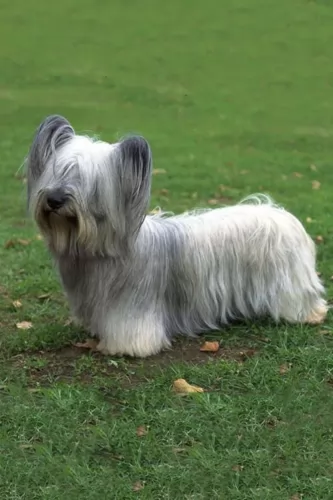 The Skye Terrier is a hardy dog breed and is actually considered to be an endangered native dog breed in the United Kingdom.
The Skye Terrier is a hardy dog breed and is actually considered to be an endangered native dog breed in the United Kingdom.
They were found on the Isle of Skye, although there is some confusion about its history. They were used long ago to hunt but these days they are essentially companion dogs.
They found their way to America and the Skye Terrier Club of America was founded in 1938. The American Kennel Club recognized the breed in 1887.
 The Dunker is a medium sized dog which stands at between 50-55cms with females being slightly smaller at 47-52cms. They usually weigh between 11-18kg and look similar to other scenthounds, being muscular and athletic.
The Dunker is a medium sized dog which stands at between 50-55cms with females being slightly smaller at 47-52cms. They usually weigh between 11-18kg and look similar to other scenthounds, being muscular and athletic.
The ears of the Dunker are floppy, the tail is long and carried straight with a bit of a curve, the nose is large and black as well as the eyes, but some dogs have light eyes which can even be blue.
The coat of the Dunker is straight and dense and this coat of his is well known for the unique color of the coat – blue or black dappled, while some dogs will have black, tan and white markings. White faces are preferred but you will find dogs with black masks.
This is a non-aggressive dog and can become quite friendly when trained and socialized.
They are dogs that form strong bonds with their owners, being particularly good around children. They get on well with dogs and other pets in the home.
They’re intelligent dogs and are are easy to train. In fact, training and socialization is recommended for this dog as he does tend to be a bit stubborn.
Training ensures he is relaxed and obedient. He is an active dog and will certainly require some exercise each day. He’ll respond willingly if you call him to join you in your jogging- or cycling outings.
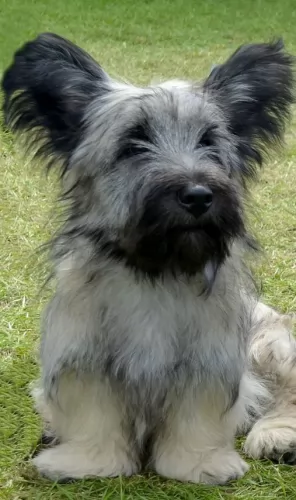 The Skye Terrier is a medium-sized dog standing at between 23 and 26cm in height and weighing between 12 and 18kg. The legs are short and sturdy. He is double coated with the top coat being straight and hard and forming a beard around the face area. The coat can be fawn, and in various shades of grey which are sometimes even black. The ears of the dog are medium sized and erect.
The Skye Terrier is a medium-sized dog standing at between 23 and 26cm in height and weighing between 12 and 18kg. The legs are short and sturdy. He is double coated with the top coat being straight and hard and forming a beard around the face area. The coat can be fawn, and in various shades of grey which are sometimes even black. The ears of the dog are medium sized and erect.
The Skye Terrier has always been a hunting dog and he enjoys quite a bit of exercise – walks, ball games as well as indoor games. Small though he may be, he is strong willed with a mind of his own and will benefit from being trained and socialized.
This is also necessary as he has a fairly reserved nature. He gets on well with children and makes an excellent family pet but he is ready to take on smaller pets in the home. He will bark when confronting strangers and makes an excellent watchdog too.
He is able to adapt well into life in the city or the countryside. He isn’t a dog to be left outside day after day and will just die of boredom, frustration and loneliness.
 The Dunker is such a good tempered dog and he will be happy to settle in the city or the countryside with his owner.
The Dunker is such a good tempered dog and he will be happy to settle in the city or the countryside with his owner.
When you look at his history, he is a hunting dog, used for hunting rabbits. Being an active breed, he is better suited to living in a home where there is at least a fair sized garden.
He isn’t a high maintenance dog either, so no special attention to grooming is required. Being a fairly healthy breed, he isn’t likely to develop any serious health issues too. This low-maintenance, undemanding Norwegian Hound makes a splendid pet.
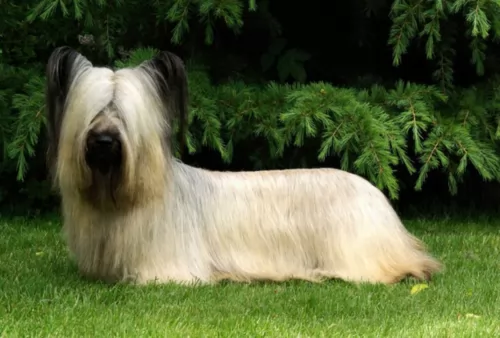 Give the Skye Terrier the attention he wants and he will reward you with his loving companionship.
Give the Skye Terrier the attention he wants and he will reward you with his loving companionship.
He loves the entire family but is best suited to homes where children have been taught to be kind to animals and to treat them with respect.
He has moderate energy levels and will expect you to give him a fair amount of exercise. The Skye Terrier can make an excellent companion for you and your family.
 The Dunker dog can live to reach a ripe age of 12 to 15 years. There are some health issues he may face -
The Dunker dog can live to reach a ripe age of 12 to 15 years. There are some health issues he may face -
Partial or complete hearing loss can come about because of dirt or wax build-up in the ear canals. It can be because of an untreated ear infection, an injury or even old age.
Your veterinarian can examine your dog’s ear canal. Certain dog breeds such as the Dunker and others are more predisposed to deafness and you’ll find your dog responding slowly to your voice or he may be totally startled when woken.
Your vet will determine the type of treatment for your dog if an ear infection for instance is suspected. Treatment in this case may involve cleaning wax out of the ears or getting rid of overgrown ear hair.
Hip dysplasia is an inherited condition with your dog where bone rubs against other bone. Your Dunker dog will be in pain and his movement could be limited and he may even become lame. Get your pet to the vet because there are a number of treatment options.
Take a look at your pet’s eyes so that you’re aware of cloudiness, inflammation, discharge, a change in eye color or red eyelid lining. Take him to the vet if you suspect something serious, but in the meantime you can also gently wipe over your pet’s eyes to remove any discharge.
If you do need to bath your pet, make sure to protect his eyes before applying any lotion.
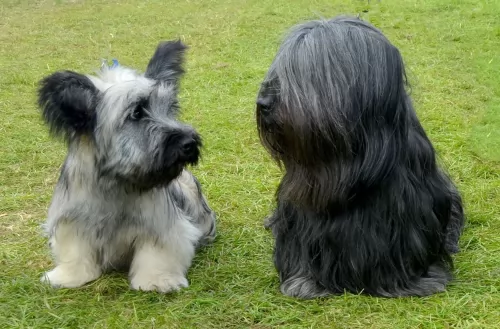 The Skye Terrier is a healthy dog breed. Perhaps the only issue that could be a problem with him is orthopedic problems. He is an achondroplastic dog, meaning a large body on small legs.
The Skye Terrier is a healthy dog breed. Perhaps the only issue that could be a problem with him is orthopedic problems. He is an achondroplastic dog, meaning a large body on small legs.
He could develop spinal problems if he were allowed to constantly be jumping off beds and high chairs.
Orthopedic problems affect the bones, muscles and joints and can actually be debilitating. Orthopedic conditions can be ligament tears or hip dysplasia for instance, accompanied by arthritis.
You’ll notice your dog has an abnormal way of walking or running, inability to get up once lying down and he may have arthritis and pain.Be careful because obesity can trigger problems with the joints and bones.
 The Dunker is a dog with stamina and energy and he will need a walk every day as well as some other forms of vigorous exercise. The idea is to involve a dog like this in all your activities, whether you go running, swimming or cycling.
The Dunker is a dog with stamina and energy and he will need a walk every day as well as some other forms of vigorous exercise. The idea is to involve a dog like this in all your activities, whether you go running, swimming or cycling.
The Dunker isn’t going to require you to spend a lot of money on maintenance for him. A good brush-down twice a week will be adequate as he is a fairly heavy shedder and brushing him will get rid of all those loose hairs. It is also time to check him over for fleas and ticks too.
Other grooming aspects to check will include nail trimming, checking the inside of the dog’s ears for excess wax build-up and dirt.
Dental care is of major concern because teeth left unattended can result in mouth bacteria. This bacteria enters the blood stream and results in systemic infection. Sometimes the bad teeth can be so painful that a dog no longer wants to eat.
It is imperative to brush your pet’s teeth at least 2 or 3 times a week with a special dog toothbrush and toothpaste.
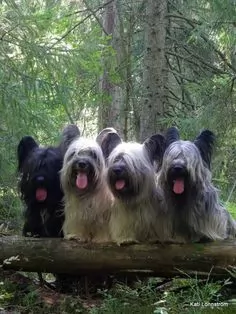 ● The coat of the Skye Terrier is long and silky and will most certainly require brushing every day if you keep the hair long. Such silky hair can easily become matted.
● The coat of the Skye Terrier is long and silky and will most certainly require brushing every day if you keep the hair long. Such silky hair can easily become matted.
● Little dogs like this will need their teeth being checked regularly. You can even try to buy special pet toothpaste and toothbrush and brush his teeth yourself. If you prefer, a professional dog groomer can do this for you and at the same time trim his nails and check his ears and clean the insides of the ears too to avoid infection.
● Provide him with top quality food as the quality of the dog food you buy makes a huge difference to his health and longevity. He is a small dog and there are some excellent commercially manufactured dog foods specially made for small, energetic dogs.
Try to include some home-made food for him which can be simply mixed into the dry kibble twice a week. Boiled chicken, brown rice or pasta and spinach, sweet potatoes and carrots is super tasty and nutritious. Ensure there is always a bowl of fresh, cool water within his reach.
● Keep his vaccines up to date against some deadly canine diseases, and get him to the vet when he shows signs of illness.